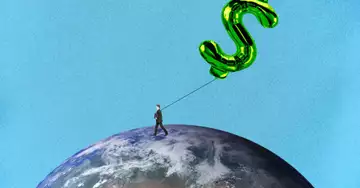They called it the Great Moderation.
After Federal Reserve Governor Paul Volcker halted inflation in the U.S. in the 1980s, the U.S. and other Western economies experienced a happy, multi-decade period of favorable consumer price developments with modest, predictable increases averaging about 2% per year. This contributed significantly to a positive feedback loop: Confidence in the independent monetary policies of central banks grew and solidified, and as a result, economies and stock markets boomed.
There were some difficult periods - the dot.com collapse in 2000 and the Great Financial Crisis of 2008, to name just two - and the widening gap between the haves and the have-nots led to disenchantment with the policy model by which Wall Street acquired its wealth. However, the fact that inflation, with all the uncertainty and stress it brings to economic decision-making, was a distant memory meant that the ship of economic expansion was consistently put back on course.
You're reading Money Reimagined, a weekly look at the technological, economic and social events and trends that are redefining our relationship with money and transforming the global financial system. Subscribe to the full newsletter here.
Now. What does the current experience of rising prices mean for the long-term global economic outlook? And what might it mean for Bitcoin? Its proponents portray it as an inflation hedge, but in recent months it has hardly deserved that status as its price in dollars has fluctuated in line with the ups and (mostly) downs of the stock market.
The best way to answer these questions is to consider the impact of continued price uncertainty on economic and, just as importantly, political decision making.
Uncertainty is back
Faced with an 8.5% inflation rate in March and the largest interest rate hike in 22 years as the Federal Reserve attempts to bring inflation down, Americans across the economic spectrum - and not just lower-income populations - face economic dilemmas on a daily basis that they haven't experienced in decades. Do I buy a new car now in case it gets more expensive in the future, or should I worry about my job security in light of all the talk about an impending recession? This kind of uncertainty, as it spreads throughout society, has profound implications for the economy as a whole.
This uncertainty is an unpleasant experience for anyone who is not one of the smartest (and luckiest) people figuring out how to make money in an inflationary environment. And it inevitably has political consequences. Think of how inflation doomed Jimmy Carter's one-year presidency in 1980. Or think of the constant changing of governments in inflation-plagued economies like Argentina.
Already, many believe President Joe Biden is doomed to go the way of Jimmy Carter. His approval rating was a miserable 41.3% in the latest Gallup poll.
Adding to Biden's fears is the specter of stagflation, a dual phenomenon of inflation and unemployment that could be triggered by pandemic-related supply chain disruptions. The fear is that even if the Fed pushes us into recession, weakening aggregate demand will not break the inflation cycle because it will be offset by the price-increasing effect of supply-related costs.
News from Amazon and Apple has already pointed to the impact on corporate balance sheets of supply problems triggered by the recent COVID-related freeze in China. That's a potential recipe for stagflation. And it's every policymaker's nightmare.
Shifting the political equation
Beyond the dangers to incumbent politicians at the ballot box, inflation may be very different than it was in 1980, when there was generally greater confidence in the way society was governed. Over time, coinciding with the disruptions caused by globalization and the Internet, trust in government, corporations, law enforcement, the media, and other key institutions has declined, as Edelman documents in its annual Trust Barometer report.
This growing discontent adds another layer of unpredictability to people's political and economic decisions. For example, if Donald Trump runs for Republican again in 2024, what will that mean for all those swing voters who voted against him in disgust in 2020? Maybe they'll hold their nose and vote him back into power, but they won't be happy about it. And the Democrats, well, they'll be downright depressed. Distrust of the political outcome and the system that brought it about will reach levels that were not the case when Ronald Reagan defeated Carter in 1980.
In other words, there is a growing sense that traditional politics will not be the solution to our economic problems.
Money matters
How will this political disillusionment affect how people think about money?
Well, it's important to realize that money has been a largely political project for millennia, with governments trying to control the issuance and circulation of money. The era of fiat money in the last 50 years was the culmination of this effort.
But throughout history, when confidence in the political system has fallen to low levels, people have turned to alternatives, gold being the primary example.
Now Bitcoin offers an alternative with valuable properties beyond that of a mere store of value. Most importantly, Bitcoin is digital, which means it can be integrated into the prevailing Internet economy with programmable capabilities. And its functionality - both its enforced scarcity and its transaction and record-keeping mechanisms - is determined by an essentially community consensus process.
In other words, Bitcoin is actually an alternative governance system for our money. There is no guarantee that people will embrace it en masse, but the current era of economic and governmental uncertainty and the distrust it will sow in institutions is a good reason to do so.

